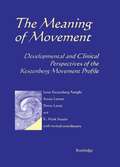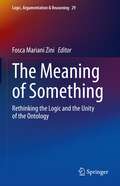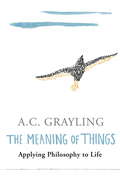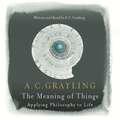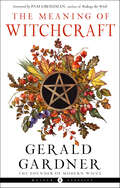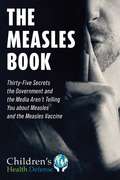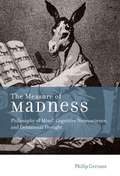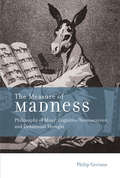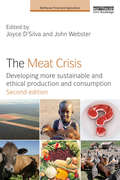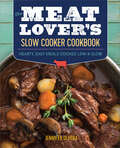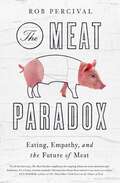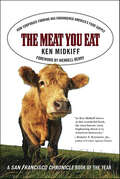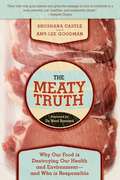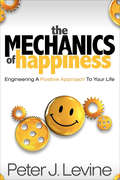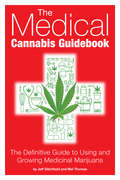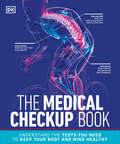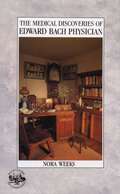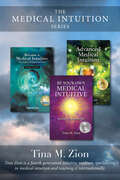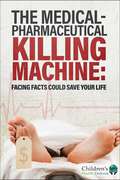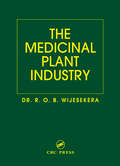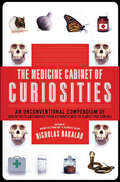- Table View
- List View
The Meaning of Movement: Developmental and Clinical Perspectives of the Kestenberg Movement Profile
by Janet Kestenberg Amighi Susan Loman Penny Lewis K. Mark SossinThe primary objective of this book is to present the Kestenberg Movement Profile (KMP)--a multi-tiered system for the notation of observed movement patterns, classification of these patterns, and analysis of an individual's movement repertoire.
The Meaning of Something: Rethinking the Logic and the Unity of the Ontology (Logic, Argumentation & Reasoning #29)
by Fosca Mariani ZiniThis innovative volume investigates the meaning of ‘something’ in different recent philosophical traditions in order to rethink the logic and the unity of ontology, without forgetting to compare these views to earlier significative accounts in the history of philosophy. In fact, the revival of interest in “something” in the 19th and 20th centuries as well as in contemporary philosophy can easily be accounted for: it affords the possibility for asking the question: what is there? without engaging in predefined speculative assumptions The issue about “something” seems to avoid any naive approach to the question about what there is, so that it is treated in two main contemporary philosophical trends: “material ontology”, which aims at taking “inventory” of what there is, of everything that is; and “formal ontology”, which analyses the structural features of all there is, whatever it is. The volume advances cutting-edge debates on what is the first et the most general item in ontology, that is to say “something”, because the relevant features of the conceptual core of something are: non-nothingness, otherness. Something means that one being is different from others. The relationality belongs to something.: Therefore, the volume advances cutting-edge debates in phenomenology, analytic philosophy, formal and material ontology, traditional metaphysics.
The Meaning of Things: Applying Philosophy to life
by A.C. GraylingA refreshing distillation of insights into the human condition, by one of the best-known and most popular philosophers in the UK.Thinking about life, what it means and what it holds in store does not have to be a despondent experience, but rather can be enlightening and uplifting. A life truly worth living is one that is informed and considered so a degree of philosophical insight into the inevitabilities of the human condition is inherently important and such an approach will help us to deal with real personal dilemmas.This book is an accessible, lively and thought-provoking series of linked commentaries, based on A. C. Grayling's 'The Last Word' column in the GUARDIAN. Its aim is not to persuade readers to accept one particular philosophical point of view or theory, but to help us consider the wonderful range of insights which can be drawn from an immeasurably rich history of philosophical thought.Concepts covered include courage, love, betrayal, ambition, cruelty, wisdom, passion, beauty and death. This will be a wonderfully stimulating read and act as an invaluable guide as to what is truly important in living life, whether facing success, failure, justice, wrong, love, loss or any of the other profound experience life throws out.
The Meaning of Things: Applying Philosophy to life
by Prof A.C. GraylingA refreshing distillation of insights into the human condition, by one of the best-known and most popular philosophers in the UK.Thinking about life, what it means and what it holds in store does not have to be a despondent experience, but rather can be enlightening and uplifting. A life truly worth living is one that is informed and considered so a degree of philosophical insight into the inevitabilities of the human condition is inherently important and such an approach will help us to deal with real personal dilemmas.This book is an accessible, lively and thought-provoking series of linked commentaries, based on A. C. Grayling's 'The Last Word' column in the GUARDIAN. Its aim is not to persuade readers to accept one particular philosophical point of view or theory, but to help us consider the wonderful range of insights which can be drawn from an immeasurably rich history of philosophical thought.Concepts covered include courage, love, betrayal, ambition, cruelty, wisdom, passion, beauty and death. This will be a wonderfully stimulating read and act as an invaluable guide as to what is truly important in living life, whether facing success, failure, justice, wrong, love, loss or any of the other profound experience life throws out.
The Meaning of Things: Applying Philosophy to life
by Prof A.C. GraylingThinking about life, what it means and what it holds in store does not have to be a despondent experience, but rather can be enlightening and uplifting. A life truly worth living is one that is informed and considered so a degree of philosophical insight into the inevitabilities of the human condition is inherently important and such an approach will help us to deal with real personal dilemmas.This book is an accessible, lively and thought-provoking series of linked commentaries, based on A.C Grayling's 'The Last Word' column in the Guardian. Its aim is not to persuade readers to accept one particular philosophical point of view or theory, but to help us consider the wonderful range of insights which can be drawn from an immeasurably rich history of philosophical thought.Read by AC Grayling(p) 2005 Orion Publishing Group
The Meaning of Witchcraft (Weiser Classics Series)
by Gerald Gardner"Those of us who use the word witch with all of the pride and fortification that it offers us do so thanks to Gardner's lucid, liberating vision."—Pam Grossman, author of Waking the Witch: Reflections on Women, Magic, and Power Often called the father of modern witchcraft, Gerald Gardner's life and works were ground-breaking in opening the door for the modern revival of Wicca and neo-paganism. The Meaning of Witchcraft (originally published in 1959) was the first sympathetic book written from the point of view of a practicing witch. "The foundation of magical beliefs," Gardner wrote, "of which witchcraft is a form, is that unseen Powers exist, and that by performing the right sort of ritual, these Powers can be contacted and either forced or persuaded to assist one in some way. People believed this in the Stone Age, and they believe it, consciously or not, today. It is now well known that most superstition is, in fact, broken-down ritual. The meaning of witchcraft is to be found not in strange religious theories about God and Satan but in the deepest levels of the human mind, the collective unconscious, and the earliest developments of human society."The Meaning of Witchcraft is an enduring and invaluable source book for witches today. This Weiser Classics edition includes a new foreword by Pam Grossman, author of Waking the Witch. In it, Grossman revisits the historical role and mixed legacy that Gardner has played in the revival of witchcraft and magic in modern times.
The Measles Book: Thirty-Five Secrets the Government and the Media Aren't Telling You about Measles and the Measles Vaccine (Children’s Health Defense)
by Children's Health DefenseDiscover thirty-five secrets that the media, US government, and Big Pharma don't want you to know about vaccines. Measles! We all have seen or heard the scary stories about &“outbreaks&” in the media. It has even been declared a &“public health emergency&” at various times. Is it true? Are we and our children at risk? The Measles Book: Thirty-Five Secrets the Government and the Media Aren&’t Telling You about Measles and the Measles Vaccine will help you answer these questions. You will find out if this is just another example of the media, government, and industry misleading us or whether we really have a lot to worry about. The Measles Book presents reliable medical information from the most credible sources available. It is intended to help you make an informed choice about vaccinating your child. The main focus is measles, but many of the issues are relevant to other childhood vaccines. Within the book's pages, the reader will discover thirty-five secrets being kept from the general public about childhood vaccines, especially the measles vaccine. Just a sampling of these secrets include: Vaccines are not safe for every child and the government and pharmaceutical companies have known this for years.Some children will get injured or die from vaccines and the government and pharmaceutical companies know this, too.Pharmaceutical companies have developed an incredible way to make money from vaccines, and not be held accountable.When a child is injured or killed by a vaccine, the pharmaceutical company does not pay for the damage it caused—we do! Learn the other thirty-one secrets when you read The Measles Book by Children's Health Defense, a nonprofit organization committed to the health of our children and challenging misinformation spread by Big Pharma, the government, and the media. The information in The Measles Book is vital for parents to know so they can make informed decisions for their children.
The Measure of Madness
by Philip GerransIn The Measure of Madness, Philip Gerrans offers a novel explanation of delusion. Over the last two decades, philosophers and cognitive scientists have investigated explanations of delusion that interweave philosophical questions about the nature of belief and rationality with findings from cognitive science and neurobiology. Gerrans argues that once we fully describe the computational and neural mechanisms that produce delusion and the way in which conscious experience and thought depend on them, the concept of delusional belief retains only a heuristic role in the explanation of delusion.Gerrans proposes that delusions are narrative models that accommodate anomalous experiences. He argues that delusions represent the operation of the Default Mode Network (DMN) -- the cognitive system that provides the raw material for humans' inbuilt tendency to provide a subjectively compelling narrative context for anomalous or highly salient experiences -- without the "supervision" of higher cognitive processes present in the nondelusional mind. This explanation illuminates the relationship among delusions, dreams, imaginative states, and irrational beliefs that have perplexed philosophers and psychologists for over a century. Going beyond the purely conceptual and the phenomenological, Gerrans brings together findings from different disciplines to trace the flow of information through the cognitive system, and applies these to case studies of typical schizophrenic delusions: misidentification, alien control, and thought insertion. Drawing on the interventionist model of causal explanation in philosophy of science and the predictive coding approach to the mind influential in computational neuroscience, Gerrans provides a model for integrative theorizing about the mind.
The Measure of Madness: Philosophy of Mind, Cognitive Neuroscience, and Delusional Thought (Life and Mind: Philosophical Issues in Biology and Psychology)
by Philip GerransDrawing on the latest work in cognitive neuroscience, a philosopher proposes that delusions are narrative models that accommodate anomalous experiences.In The Measure of Madness, Philip Gerrans offers a novel explanation of delusion. Over the last two decades, philosophers and cognitive scientists have investigated explanations of delusion that interweave philosophical questions about the nature of belief and rationality with findings from cognitive science and neurobiology. Gerrans argues that once we fully describe the computational and neural mechanisms that produce delusion and the way in which conscious experience and thought depend on them, the concept of delusional belief retains only a heuristic role in the explanation of delusion.Gerrans proposes that delusions are narrative models that accommodate anomalous experiences. He argues that delusions represent the operation of the Default Mode Network (DMN)—the cognitive system that provides the raw material for humans' inbuilt tendency to provide a subjectively compelling narrative context for anomalous or highly salient experiences—without the “supervision” of higher cognitive processes present in the nondelusional mind. This explanation illuminates the relationship among delusions, dreams, imaginative states, and irrational beliefs that have perplexed philosophers and psychologists for over a century.Going beyond the purely conceptual and the phenomenological, Gerrans brings together findings from different disciplines to trace the flow of information through the cognitive system, and applies these to case studies of typical schizophrenic delusions: misidentification, alien control, and thought insertion. Drawing on the interventionist model of causal explanation in philosophy of science and the predictive coding approach to the mind influential in computational neuroscience, Gerrans provides a model for integrative theorizing about the mind.
The Measurement of Affect, Mood, and Emotion
by Panteleimon EkkekakisThe role of affective constructs in human behavior in general, and health behavior in particular, is recapturing the attention of researchers. Affect, mood, and emotion are again considered powerful motives behind dietary choices, physical activity participation, cigarette smoking, alcohol over-consumption, and drug abuse. However, researchers entering the fray must confront a vast and confusing theoretical and technical literature. The enormity of this challenge is reflected in numerous problems plaguing recent studies, from selecting measures without offering a rationale, to interchanging terms that are routinely misconstrued. The Measurement of Affect, Mood, and Emotion cuts through the jargon, clarifies controversies, and proposes a sound three-tiered system for selecting measures that can rectify past mistakes and accelerate future progress. Panteleimon Ekkekakis offers an accessible and comprehensive guidebook of great value to academic researchers and postgraduate students in the fields of psychology, behavioral and preventive medicine, behavioral nutrition, exercise science, and public health.
The Meat Crisis: Developing more Sustainable and Ethical Production and Consumption (Earthscan Food and Agriculture)
by John Webster Joyce D'SilvaMeat and dairy production and consumption are in crisis. Globally, 70 billion farm animals are used for food production every year. It is well accepted that livestock production is a major contributor to greenhouse gas emissions. The Food and Agriculture Organization of the United Nations (FAO) predicts a rough doubling of meat and milk consumption in the first half of the 21st century, with particularly rapid growth occurring in the developing economies of Asia. What will this mean for the health and wellbeing of those animals, of the people who consume ever larger quantities of animal products, and for the health of the planet itself? The new edition of this powerful and challenging book explores the impacts of the global growth in the production and consumption of meat and dairy, including cultural and health factors, and the implications of the likely intensification of farming for both small-scale producers and for animals. Several chapters explore the related environmental issues, from resource use of water, cereals and soya, to the impact of livestock production on global warming and issues concerning biodiversity, land use and the impacts of different farming systems on the environment. A final group of chapters addresses ethical and policy implications for the future of food and livestock production and consumption. Since the first edition, published in 2010, all chapters have been updated, three original chapters re-written and six new chapters added, with additional coverage of dietary effects of milk and meat, antibiotics in animal production, and the economic, political and ethical dimensions of meat consumption. The overall message is clearly that we must eat less meat to help secure a more sustainable and equitable world.
The Meat Lover’s Slow Cooker Cookbook: Hearty, Easy Meals Cooked Low and Slow
by Jennifer OlveraCalling all lovers of shanks and shoulders, rumps and roasts! Bring everyone to the table with The Meat Lover's Slow Cooker Cookbook for meals featuring delicious, tender meat—even on your busiest days.For years, food writer and recipe developer Jennifer Olvera dedicated her weekends to making stovetop meals for the week—until the slow cooker revolutionized her weeknight dinners. She began converting her favorite recipes to the slow cooker and found herself being asked for those recipes again and again.In The Meat Lover's Slow Cooker Cookbook Jennifer has handpicked her most-requested recipes that will surely become mainstays in your home, too.This slow cooker cookbook offers:VARIETY—From sliders and stews to roasts and ribs, more than 100+ thoughtfully selected family slow cooker recipes cover a wide range of meaty mainstays.FLEXIBILITY—Spend a little extra prep time to achieve the deepest flavor, or skip the prep to get cooking right away.CUSTOMIZATION—Pair your protein with the perfect side—whether you're craving nourishing greens or classic baked beans, you'll find plenty of options to choose from.AFFORDABILITY—Let the slow cooker make edible magic of cheap cuts of meat.The Meat Lover's Slow Cooker Cookbook is your complete resource for hearty slow cooker recipes that deliver the quality (and quantity!) that your family craves.
The Meat Paradox: Eating, Empathy, and the Future of Meat
by Rob PercivalFrom a vital new voice in food ethics comes a smart, nuanced investigation into the current meat debate.Our future diet will be shaped by diverse forces. It will be shaped by novel technologies, by geopolitical tensions, and the evolution of cultural preferences, by shocks to the status quo— pandemics and economic strife, the escalation of the climate and ecological crises—and by how we choose to respond. It will also be shaped by our emotions. It will be shaped by the meat paradox. "Should we eat animals?&” was, until recently, a question reserved for moral philosophers and an ethically minded minority, but it is now posed on restaurant menus and supermarket shelves, on social media and morning television. The recent surge in popularity for veganism in the UK, Europe and North America has created a rupture in the rites and rituals of meat, challenging the cultural narratives that sustain our omnivory. In The Meat Paradox, Rob Percival, an expert in the politics of meat, searches for the evolutionary origins of the meat paradox, asking when our relationship with meat first became emotionally and ethically complicated. Every society must eat, and meat provides an important source of nutrients. But every society is moved by its empathy. We must all find a way of balancing competing and contradictory imperatives. This new book is essential reading for anyone interested in the origins of our empathy, the psychology of our dietary choices, and anyone who has wondered whether they should or shouldn't eat meat.
The Meat You Eat: How Corporate Farming Has Endangered America's Food Supply
by Ken Midkiff"We have given up to the agribusiness corporations a crucial part of our responsibility as human beings and we must now think of ways to take it back."- Wendell Berry, from the ForewordIn this eye-opening book, Sierra Club Director Ken Midkiff exposes the dangers posed by corporate control of agriculture (agribusiness)--to our health, and to the health of the nation's economy, security, and the environment. The Meat You Eat explores the current practices of the corporations taking over the raising and slaughtering of farm animals (and farmed fish, such as salmon). These companies use a model that has transformed livestock farming from quality-driven family-owned operations into big businesses concerned with volume, efficiency, uniformity, and profits above all. Midkiff reveals the true cost of agribusiness on all levels-environmental, financial, moral, legal, and medical-balancing startling truths with practical solutions. Rather than advocate a vegan or vegetarian diet, Midkiff argues that using and supporting local farmers will improve the quality of life for us all, as well as for the animals whose meat we eat. Complete with resource sections about where to find local farmers and lists of agribusiness culprits, the book encourages us to take an active interest in what we put on our plates and in our mouths, and use the power of our pocketbooks to make it clear that our health, our environment, and our communities are of vital importance.With a foreword by Wendell Berry, hailed by The New York Times Books Review as the "great moral essayist of our day," The Meat You Eat is an informative and ringing call to arms.
The Meaty Truth: Why Our Food is Destroying Our Health and Environment—and Who is Responsible
by Neal Barnard Shushana Castle Amy-Lee GoodmanThe Meaty Truth is an eye-opening look at the massive problems caused by the American population's food supply. Water, meat, and milk and other dairy products are filled with toxins, antibiotics, untested growth hormones, ammonia, and animal pus and manure. The current conditions of the food production industry must drastically improve, and until they do, it is absolutely vital to monitor what you eat. Castle and Goodman take a hard-hitting look at what America is putting into its food, the negative effects this has on the world, and the best ways to make healthy, informed decisions about eating.As the antibiotic age ends, the rise of pandemic diseases is approaching. Approximately half of the illnesses that claim American lives today are related to what we eat, and our health-care system is focused on treating the sick, not preventing illnesses from occurring. To fix our health problems, to continue feeding the world's ever-growing population, and to save our planet from ecological destruction, we can no longer avoid making changes to how American meat and dairy are produced. This guide is easy to read, applicable to anyone's lifestyle, and impossible to put down.
The Mechanics of Happiness: Engineering A Positive Approach To Your Life
by Peter J. LevineThe Mechanics of Happiness shows you how to live an enhanced life. Happiness, fulfillment and personal growth are the first steps on a journey of discovery that will revolutionize the way you view yourself and the world. Throughout the ages powerful knowledge has been kept hidden. Secrecy has prevented people from enjoying the proven benefits of having access to the greatest knowledge of all. Now you too can use these tools previously only available to the elite few to better understand your own life and its possibility. The most fundamental questions in all our lives are addressed in a simple and accessible way. Who am I? What is the purpose of life? How can I live the best life possible? Using easily applied methods your perceptions will be upgraded and your understanding refined. The Mechanics of Happiness is a tool kit, a user’s manual for life and a cascade of gems that can enrich your life immeasurably. In your ongoing journey you need a companion, a mentor and a guide; The Mechanics of Happiness is those things and so much more, it is the springboard into a new way of thinking, a glimpse through a gateway to an alternative Universe.
The Medical Assistant: An Applied Learning Approach (9th Edition)
by Alexandra Patricia Young Debora B. KennedyThis leading, well-established textbook covers the administrative and clinical skills all medical assistants need to know, integrating all of the topics and skills competencies required by the AAMA entry-level Medical Assisting Curriculum. It features chapter outlines and learning objectives as well as relevant material dealing with personal qualities, skills, responsibilities, types of patient education, and legal and ethical issues. The unique Kinn approach - teaching essential skills alongside the medical specialty context - is the signature feature of this book. In addition, the 9th edition introduces a new "applied learning approach" that focuses on a real-world context for skills and requires the student to apply theory and skills to various case studies throughout the chapters.
The Medical Cannabis Guidebook
by Mel Thomas Jeff DitchfieldWith 18 states that have legalized the use of marijuana for medical purposes, more Americans are curious about medical cannabis: How can it help me? What illnesses does it alleviate? How do I procure it? The Medical Cannabis Guidebook: The Definitive Guide To Using and Growing Medicinal Marijuana is the most exhaustive guide to medicinal cannabis produced to date, with information regarding the types of illnesses and diseases that can be helped by cannabis, real case studies from medical users, grow information, legal advice, and more. With many recipes for extracts, descriptions of administration techniques, and discussions of the therapeutic uses of cannabis throughout the ages, The Medical Cannabis Guidebook serves as a handbook for cannabis use and also allows patients to make and grow their own medicine, prepare it in the correct way for their specific illness, dose correctly, and educate themselves so they can make their own informed choices. An indispensable guide for anyone needing medical cannabis, anyone curious about its uses and even long time users looking to get the most out of their medicine, this book is the only true medicinal cannabis handbook on the market today written by two world renowned and respected cannabis experts.
The Medical Checkup Book (DK Medical Care Guides)
by DKWritten by experts and packed with user-friendly information and practical lifestyle advice, this is the ultimate guide for anyone interested in their health. Knowing which health checks and tests to get when can prevent illness and problems, and even save your life. This easy-to-use guide explains all the common health tests so that you can understand and manage your well-being. When you've had a physical, how often do you understand what the results really mean for your health and your lifestyle? You've probably heard of good cholesterol and bad cholesterol, but what does that mean? And what can you do if you're told your bad cholesterol is high? Why are there two figures to show your blood pressure? Is weight gain hereditary? Be proactive in managing your health by learning more about how it is measured. Discover what factors influence medical tests, and what lifestyle changes you can make to keep fit and healthy for longer. Explore the variety of tests and screenings you may undergo at a doctor's or workplace health assessment - find out what is tested, why it is tested, and what the results mean.The Medical Checkup Book is the only visual guide to explain all common medical tests and what preventative measures you can take to minimize the risks and maximize your health.
The Medical Discoveries Of Edward Bach Physician
by Nora WeeksIn 1912 Edward Bach qualified as a medical doctor and embarked upon a career which not only had a profound effect on medical science, but brought to ordinary people the world over, a simple, safe and effective system of healing.Dr. Bach made a detailed study of bacteriology, immunology and homeopathy and found a clear connection between chronic disease and negative mental attitudes. It was the relationship between mind and body which formed the basis of his further research and as he became increasingly convinced that emotional harmony was the key to good health, he was determined to find a simple, non-invasive and harmless method of healing which could be used safely by everyone.The Medical Discoveries of Edward Bach tells how Dr. Bach's work developed, from his childhood hopes and dreams of a healthy society, to the discovery of a complete system of 38 natural remedies which address all aspects of human nature, emotional outlook and personality. Edward Bach was an eminent physician whose remarkable contribution to medicine, healing and humanity has yet to be fully realised.
The Medical Intuition series ebook bundle: Six Underlying Causes Of Illness And Unique Healing Methods (Medical Intuition Ser. #2)
by Tina M. ZionAward Winning Medical Intuition SeriesBecome a Medical Intuitive immediately amplifies your intuition and directs you through the primary steps to do medical intuitive readings for others.Advanced Medical Intuition removes blockages, opens the healer within you, and expands your accuracy. Professional intuitives, and newly aware intuitives, will learn creative, new healing processes to help heal others in profound ways.Be Your Own Medical Intuitive speaks to everyone, from all backgrounds, who realize it is time to bring healing into their own body and life now. This book teaches new skills, new techniques and new pathways for permanent, profound healing of your physical body, your energy body and yes, even your soul.
The Medical-Pharmaceutical Killing Machine: Facing Facts Could Save Your Life
by Children's Health DefenseMedical and pharmaceutical history is replete with examples of dangerous interventions that have poisoned, injured, or killed. However, events since 2020 have attracted attention as never before to medicine&’s potential to be both lethal and malevolent. In The Medical-Pharmaceutical Killing Machine, Children&’s Health Defense situates current perils in their broader context with the aim of helping readers understand how to protect themselves and their loved ones. In the Greek Trojan War saga, the god Apollo ensured that Cassandra&’s prophecies would never be believed, with disastrous consequences. As recounted in the book, modern medicine, too, has produced its fair share of &“medical Cassandras&”—doctors and writers who have tried to warn the public about medicine&’s life-threatening underbelly, generally to little avail. A chapter dedicated to nine of these medical skeptics, beginning with Ivan Illich and his coining of the term &“iatrogenesis&” to describe adverse outcomes caused by doctors, weaves a powerful portrait of harms regularly denied and ignored, with those making the claims typically marginalized and &“canceled.&” The book shows that there is no shortage of tools in the killing machine arsenal. One chapter highlights the mRNA vaccine technology inaugurated with COVID, illustrating how this new mechanism for iatrogenesis is inflicting novel forms of toxicity, not all of which are yet understood. Another chapter about assisted suicide and euthanasia describes the chilling global proliferation of policies and propaganda promoting those practices for vulnerable populations that include babies, children, people diagnosed with autism, and the mentally ill. The book also describes factors that make it possible for the killing machine to continue operating with impunity, including the ascendance of an &“evidence-based medicine&” juggernaut, medical gaslighting, and a ballooning global enforcement infrastructure. Nor does it shy away from confronting what some now characterize as &“iatrogenocide&”; a chapter asking &“Why Do They Do It?&” considers money, prestige, and control as three possible answers. Ultimately, it is only by acknowledging the long-standing reality of an all-too-effective medical-pharmaceutical killing machine that people can learn to dodge the threats and work toward building a different model that prioritizes life and genuine health.
The Medicinal Plant Industry
by R. O. WijesekeraAs the medicinal plant industry blooms into a billion dollar business, it reaches beyond collection, propagation, harvesting and sale of crude vegetal drugs into product formulation, packaging and dispensing of sophisticated phyto-pharmaceuticals and herbal preparations. The scientific study of these medicines and the systematic uplifting of the industry to preserve the ancient and serve the modern, is now a global challenge.The Medicinal Plant Industry puts together the various facets of this multi-disciplinary industry and its global interest. It discusses the dire need for developing countries to acquire technologies and techniques for programmed cultivation of medicinal plants. It addresses a wide variety of topics including the old philosophies, modern impact of traditional medicines, and methods of assessing the spontaneous flora for industrial utilization. It covers aspects of cultivation and climatic variations, biological assessment and formulation, process technologies, phytochemical research and information sources. The book reviews highly developed traditional medicine in China and India, and covers experiences in Africa and other continents.
The Medicine Cabinet of Curiosities: An Unconventional Compendium of Health Facts and Oddities, from Asthmatic Mice to Plants that Can Kill
by Nicholas BakalarDelightful doses of medical miscellany about wacky doctors and their curious patients, from their smallest bones (the stapes) to their heaviest organs (the liver)In this addictive collection of trivia, Nicholas Bakalar, the "Vital Signs" columnist for The New York Times, spoons out the things you never realized you really want to know about your body and your health. Bakalar shares the wonders of medicine, from medical firsts (in 1667, the first survivor of a blood transfusion received sheep's blood) to medical onlys (rabies is the only infectious disease that is 100 percent curable when treated and 100 percent fatal if not). He takes a tour of diseases that belong in horror movies: liquefying organs, flesh-eating bacteria, mushrooms sprouting in the throat. He notes remarkable remedies, such as dark chocolate, which can stand in for blood-pressure pills. And he dissects the chemistry of the human body (including the 0.0000000000000015259 percent that is radium). With a specialist's attention to the funny bone as well as the gray matter, Bakalar's The Medicine Cabinet of Curiosities tickles the curiosity of both the healthy and the hypochondriac, following Voltaire's dictum that "the art of medicine consists of amusing the patient while nature cures the disease."
The Medicine Show: Consumer Union's Practical Guide to some Everyday Health Problems and Health Products
by The Editors of Consumer ReportsMedical advice on common health problems, facts about popular brand-name remedies, advice on buying prescription drugs, choosing a doctor and a hospital, what to have (and not have) in your medicine cabinet
